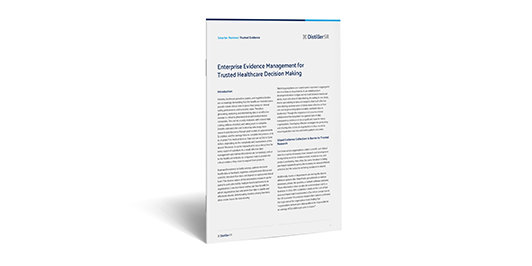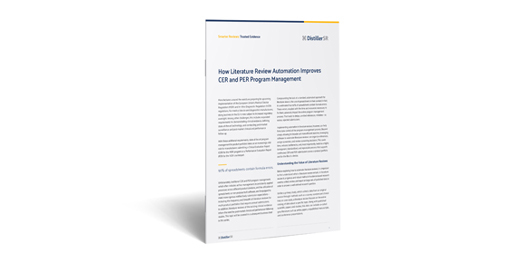Case Study
Boston Scientific Accelerated Regulatory Submissions by Transforming Literature Review Processes With DistillerSR
DistillerSR transformed BSCI’s literature review processes by improving efficiency, standardization, and traceability, which resulted in more accurate and consistent regulatory submissions.

Operational Efficiency for Complex Regulatory Submissions
Transitioning from manual spreadsheet-based data management to DistillerSR’s automated workflows and forms increased operational efficiency for EU medical device regulation (MDR) regulatory submissions while ensuring accuracy and consistency across projects.

Enhanced Traceability and Centralized Data Management

Cost Savings and Long Term Scalability
George Barnes, Senior Manager, Scientific Communications recalled his initial experience working alongside Emily: “We started with a small group, doing manually based Excel sheet screening. As MDR submissions started occurring, the frequency and volume of what we were doing increased significantly. It was efficiency and consistency that we were really after.”
“DistillerSR enabled us to create custom workflows, ensuring consistency across projects and reviewers. It significantly improved both accuracy and efficiency.”
A key part of the transition was customizing and standardizing data extraction forms to ensure consistency across similar projects. This step was essential in maintaining uniformity in data collection, which was a significant improvement over the previous Excel-based approach.
To ensure a smooth adoption process, the team closely monitored usage through background reports, identifying individuals who required additional training and support. “We had a group of early adopters who were highly motivated, but there was a learning curve as we didn’t fully understand DistillerSR’s capabilities at first,” noted George.
The team soon recognized the potential for significant efficiency gains and the opportunity to build a comprehensive dataset for use across their medical device portfolio.
One of the major advantages of DistillerSR was its centralized data management, which served as a single repository for all data related to multiple devices with similar intended purposes. This centralization greatly reduced the risk of data loss and enhanced the quality and consistency of the data used in regulatory submissions.
DistillerSR enabled Emily’s team to streamline the screening and data extraction processes, create standardized forms, and dramatically improve the traceability of their work, which had previously been a challenge with disparate Excel sheets. George noted, “Individual Excel spreadsheets tend to get lost as reviewers move on to other jobs or switch projects. DistillerSR provided a centralized resource where every decision was easily traceable, which resulted in significant improvements in the overall data management processes.”
Additionally, DistillerSR provided the team with flexibility to adjust and refine their processes based on feedback from notified bodies. This adaptability was crucial for maintaining high standards of data integrity and operational efficiency while aligning with evolving regulatory requirements.
The time required for post-market surveillance periodic updates was also significantly reduced. This improvement in efficiency allowed the team to shift focus from manual data management tasks to data analysis and interpretation. With DistillerSR, the quality and consistency of data used in submissions improved, leading to increased confidence in the data. The centralized system ensured that all information was traceable and easily accessible. The platform has also allowed the team to standardize their processes and confidently respond to regulatory bodies’ inquiries.
“We trust the data that goes into every regulatory submission and we can trace back every decision made within the platform as needed. This confidence directly translates into faster regulatory submissions for our device portfolio, DistillerSR enabled us to create custom workflows, ensuring consistency across projects and reviewers. It significantly improved both accuracy and efficiency,” highlighted Emily.
Ongoing collaboration and feedback with the DistillerSR customer success team fostered a trusted working partnership.
Emily and her team have continued to build on their use of DistillerSR, exploring new tools like CuratorCR and AI classifiers to further enhance their processes. They anticipate further efficiency gains and cost savings as they continue to leverage DistillerSR cross-functionally for new use cases from clinical evaluations to technical reports and meta-analyses for medical communications publication planning. “As we’re building our data repository, we’re seeing the potential for broader use across our clinical sciences organization, particularly as we move into the real-world evidence space”, emphasized Emily.
Download the PDF version of this case study
Related Resources

Enterprise Evidence Management for Trusted Healthcare Decision Making
Discover how an enterprise evidence management strategy can lead to product success and better patient outcomes.

How Literature Review Automation Improves CER and PER Program Management
Automated literature reviews provide greater levels of auditability and program management to CER and PER submissions
Learn More About DistillerSR





